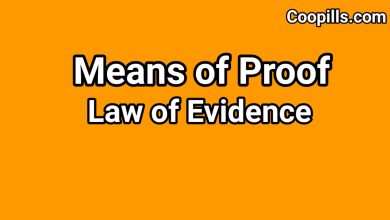Borden of Proof
In this article we shall be looking at Borden of proof in law of evidence.

The Borden Of Proof
Section 131 states
(1) “whoever desires any court to give judgement as to any legal right or liability dependent on the existence of facts which he asserts shall prove that those facts exist.
(2) when a person is bound to prove the existence of any fact it is said that the burden of proof lies on that person.”
The law of evidence is all about proof of a particular issue.
Proof in its legal meaning is the process by which the existence or non existence of facts is established to the satisfaction of the court.
Burden of proof can be divided into:
(1) Legal burden.
(2) Evidential burden.
(3) Burden on the pleadings.
See sections 133, (1-3) 139 (1-3) E.A.
The total essence of burden of proof may be crucial to the outcome of any case.
Who Must Prove?
The general principle is that he who alleges or asserts must prove. S.132 E.A.
Incidents Of The Burden
In Criminal Cases: S.139 (1-3) E.A S.36(5) 1999
Constitution of the federal Republic of Nigeria. Against the background of presumption of innocence and the rule that he who asserts must prove, the general burden of proving the guilt of the accused rests on the prosecution.
Exception To The General Rule: S.139 E.A
(1) Defence of Insanity and Intoxication
S.141 E.A S.28 and 29 of criminal code. S.217 CPA, A.
(2) Proof of special Plea: autrefois acquit or autrefois convict Section 181 & 182 CPA; S.36(9) 1999 constitution of federal Republic of Nigeria.
(3) Facts within the knowledge of the accused. S.140 E.A
(4) Burden of Proving Exemption, Exception or qualification S.141.
(5) Burden Imposed by other statutes: S.417(d) of criminal code
Exception of burden of proof In Civil Cases:
The onus of proof in civil cases does not remain static but shifts from side to side. See Sec.133(1) and (2) of Evidence Act 2011.
The position is that the onus of adducing further evidence is on the person who would fail if such evidence were not produced.
These exceptions are found more under presumptions.
(1) Presumption of Legitimacy: S.115 MCA & S.165 of evidence Act
(2) presumption of marriage- piers vs piers S.166 E.A
(3) presumption of Death: S.164(1) E.A
(4) presumption of Regularity: Nwobodo vs Onoh (1984) 1 S.C.1
(5) presumption of possession: Adenle vs Oyegbade (1964) NWLR 136
(6) Res ipsa loquitor: olatunde Thompson & ors vs S.O. Adefope 19731 All NLR.322.
(7) Admitted facts S.20 E.A
(8) Facts judicial noticed Standard of proof
The standard of proof in criminal cases is beyond reasonable doubts. See S.135 of evidence act Whereas in civil cases the proof is that of preponderance of probability or balance of probabilities in his favour. See S.134 E.A where there is allegation of crime in civil proceedings, it must be proved beyond reasonable doubt.







